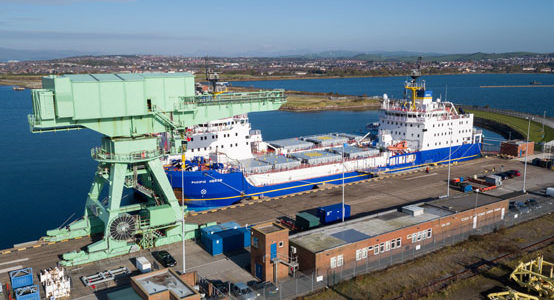
Since PNTL was established in 1975 our vessels have sailed millions of miles around the world. That means we have a responsibility to minimise our impact on the environment.
We take this responsibility seriously. Our purpose built ships are the most advanced cargo vessels in operation, but we’re not complacent and we continuously look for ways to improve the sustainability of our shipping operations; instead of waiting for regulations to come into force we proactively make changes that will make our operations more environmentally sustainable. Some of the steps we have taken are set out here.
Fuel type
In advance of the IMO 2020 change in regulations, our vessels already use Ultra low sulphur <0.1% Marine gas oil. This is the cleanest fuel available on the marine market and significantly reduces our greenhouse gas emissions.
Stern tubes lubricant
Two of our vessels have had their stern tube oil changed to bio-degradable oil, with the rest of the fleet due to make the change at their next dry dock.
Ballast water treatment
The ballast water system on board our vessels is fitted with an IMO approved treatment system that controls the transfer of harmful aquatic organisms and pathogens throughout the ships’ ballast system without the need to use chemicals in the process.
Sea water cooling systems
We use a marine growth preventer system that prevents the growth of marine organisms within our vessels’ cooling systems. This preserves the efficiency of cooling on board the vessels, and prevents damage to systems on board. Once discharged overboard, the hypochlorite we use decomposes to form harmless naturally occurring products.
Sewage treatment
A sewage treatment system is fitted to the ships that’s capable of treating black water (sewage) and grey water (other domestic water) to meet the discharge standards as required by MARPOL (the International Convention for the Prevention of Pollution from Ships).
Garbage disposal and recycling
Solid waste such as plastics, glass, and metal is sorted on board. Our ships are fitted with an incinerator that meets MARPOL requirements. Items that can’t be incinerated are compacted where possible, and then stowed on board for disposal ashore by a licenced contractor.
Oily waste
The ships are fitted with an oily bilge water separator complying with MARPOL requirements. The separator consists of a high speed centrifuge which reduces the oil content of the water to a minimum. This ensures that only uncontaminated water is discharged into the sea.
Double hull
For safety our purpose-built ships are equipped with double hulls giving them an extremely high level of survivability in the event of a collision, and greater protection to our specialist cargos and fuel oil.
Bunker fuel storage tanks
The latest generation of INF3 vessels have their main fuel storage tanks located inboard of the ship’s outer hull. In the event of the outer hull being breached, the likelihood of fuel oil escaping in to the environment is greatly reduced.
Ozone depleting coolants
On board the vessels the fixed firefighting system is of the water mist type, negating the need for ozone depleting gases. Any remaining water contaminated by chemicals such as oil is retained on board for recycling. When in port it is disposed of ashore to an approved reception facility.
Shaft alternators
Each of the two main propeller drive shafts is fitted with a shaft alternator. When the ship is at sea they can be used to generate electricity from excess power from the main engines, meaning we don’t need to use diesel generators to produce electricity.
Shore power when in Port
When in their home port of Barrow-in-Furness our vessels connect to power from ashore meaning the vessels’ own diesel generators do not need to be used to produce electricity.
Painting of the hull
The latest anti fouling paints are used on the ships’ hulls, which are very low in toxicity. The anti fouling paint helps prevent the build-up of marine growth on the hull which would increase drag and reduce efficiency.
Green Passport
When our ships were built, they were provided with a Green Passport that contains an inventory of all materials used in the vessel’s construction. This is useful for recycling at the end of the ships working life.
Redundancy in critical systems
Our vessels also have duplication and separation of all the essential systems to provide high reliability and accident survivability. In addition, no tanks or spaces containing oils or other pollutants are positioned directly adjacent to the outer hull to minimise the chances of pollution should the outer hull be ruptured during an incident.
